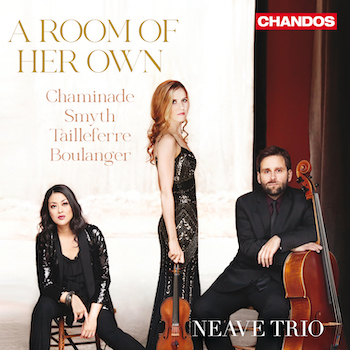Classical Album Reviews: “African American Voices 2” & “A Room of Her Own”
By Jonathan Blumhofer
Kellen Gray and the Royal Scottish National Orchestra continue its mission of bringing vital music to life; the Neave Trio releases an album of gems, a survey of piano trios by four women.

African American Voices 2, Kellen Gray and the Royal Scottish National Orchestra’s (RSNO) sequel to 2022’s African American Voices, picks up where the first release left off, programmatically, and improves considerably on the latter’s biggest weakness (its recorded sound). That’s welcome, because this music – Margaret Bonds’ Montgomery Variations, Ulysses Kay’s Concerto for Orchestra, and Coleridge Taylor Perkinson’s Worship: A Concert Overture – deserves to be heard and heard well.
Of the two big numbers, Kay’s 1948 offering stands out for its muscular rhythmic energy and strong sense of shape. It sits firmly in the mid-20th-century tonal (or, more accurately, diatonic) camp and owes a debt or two to Hindemith for its melodic structure.
Yet it’s hardly derivative. Kay crafts a series of wonderfully idiomatic episodes for each instrumental family and all of them flow gracefully one into the next.
His ear for the melodic line is always intriguing, especially in the second movement where the expected tonal landing points often veer into unexpected, dissonant directions. And Kay’s counterpoint, particularly in the finale, is quite vigorous and involved, though always well-balanced.
Bonds’ Montgomery Variations is, like the Concerto, full of melodic appeal. The score, which is dedicated to the Rev. Martin Luther King, Jr., offers a reflection on the struggle for civil rights in the eponymous Alabama city; it alludes to both the 1955-56 bus boycott and 1963 Baptist Street Church bombing, taking as its theme the spiritual, “I Want Jesus to Walk with Me.”
That tune is treated to a series of permutations which, though they don’t always exhibit the dramatic weight one might expect for music meant to depict such tumultuous, epochal times, are fresh and memorable. Among its highlights are “Decision,” with its noble setting of the spiritual; the shapely “Prayer Meeting”; folksy “Dawn in Dixie”; and flowing “Benediction.”
Perkinson’s overture also draws on religious music, this time the hymn tune OLD HUNDREDTH. But the composer, whose musical career spanned the concert hall, theater, jazz, and popular music, subtly transforms the theme in this bracing, rhythmically driven essay; it’s only intermittently recognizable.
Gray and the RSNO have its vigorous style – as well as those of the Kay and Bonds selections – well in hand: these are, at the very least, reputable, satisfying traversals of this triptych. If anything, the album’s shortcoming is its runtime. At only 48 minutes, one wouldn’t have minded the inclusion of another piece or two.
Even so, this is an album that continues its mission of bringing vital music to life. It does so both through the performances and via Gayle Murchison’s excellent, informative liner notes – which are really worth the price of the disc alone.

The Neave Trio are back, too, this time with A Room of Her Own, a survey of piano trios by four women: Lili Boulanger, Cécile Chaminade, Germaine Tailleferre, and Ethel Smyth. It’s an album of gems.
Chief among them is Smyth’s early D-minor Trio. Music of richness, lyricism, and invention, its four movements sing and dance with invigorating conviction and freshness. Though the composer’s debts to Brahms are apparent in the first movement’s lyricism, she hardly apes the melancholy German master.
Rather, Smyth goes her own way, especially in the crafty second-movement variations and the off-balance Scherzo. Throughout, her materials are top-drawer and thoroughly worked out. This is music that really ought to be a repertoire staple.
So, too, should Chaminade’s Trio No. 1and Tailleferre’s 1917 effort (which was revised near the end of its composer’s life in 1978). The latter is full of spirit: sunny, songful, droll, impish. Its highlight, though, is its beautiful, effortlessly lyrical Moderato with its surprising turns of harmony.
Chaminade’s score dates from 1880 (the same year as the Smyth). Its four movements follow a traditional cast: driving and energetic in the outer pair, soaring and hymn-like in the Andante, and with an elfin third movement. Thanks to its engaging tunefulness, Chaminade’s singular grasp of the art of composition, and the music’s breathtaking virtuosity, this is a Trio that sits in the same league as Mendelssohn’s two.
Perhaps the most familiar items here are the pair from Boulanger, D’un matin de printemps and D’un soir triste. They were written as a pair and complement each other well, the former’s dry textures and bold lines neatly complementing the latter’s sumptuous nobility.
The Neaves deliver all four works with panache. Smyth’s Trio and Chaminade’s prove particularly compelling – in particular, pianist Eri Nakamura’s navigation of the latter’s wickedly involved keyboard part is brilliant – but the whole tetralogy benefits from the group’s palpable devotion to this fare.
Jonathan Blumhofer is a composer and violist who has been active in the greater Boston area since 2004. His music has received numerous awards and been performed by various ensembles, including the American Composers Orchestra, Kiev Philharmonic, Camerata Chicago, Xanthos Ensemble, and Juventas New Music Group. Since receiving his doctorate from Boston University in 2010, Jon has taught at Clark University, Worcester Polytechnic Institute, and online for the University of Phoenix, in addition to writing music criticism for the Worcester Telegram & Gazette.
Tagged: Chandos Records, Kellen Gray, Linn, The Neave Trio
